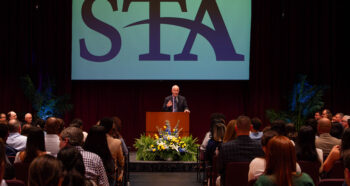Shamim Chowdhury, Cambridge’s Regional Manager for Recognition and Policy, South Asia looks at the experiences of a group of former Cambridge students from India who have gone on to study overseas. The students describe how Cambridge qualifications supported their university applications and boosted their performance.
Many Indian students plan to travel overseas for their university education, with numbers surging since the pandemic in what a World Bank blog has described as ‘India’s great student out-migration’. Backing this up, the 2023 Open Doors Report on International Educational Exchange showed that India was the second largest country sending international students to the US (after China), with student numbers up 35% on the previous year. Our latest Cambridge Student Destination Survey echoes these findings, revealing that India, the US and UK are the top three study destinations for Indian students who have studied Cambridge International AS & A Level qualifications.
There are many reasons why Indian students decide to move abroad to study. Some believe it will improve their employment prospects, especially if they gain a place at a world-renowned university. Others want to apply to a specific course which they can only find abroad, or simply want to experience life and learning in another country, recognising the positive impact this can have on personal development. The availability of scholarships for international students can be another incentive.
Where to apply and what to study?
According to our Destinations Survey, the five most popular degree subjects for Cambridge International AS & A Level students who graduated from schools in India in 2023 were Business & Management, Economics, Engineering, Computer Science/ICT, and Accounting & Finance. Some Indian schools also noted a rise in students choosing specialised courses, such as biotechnology and artificial intelligence (AI).
Former Cambridge student Raghav Tiwari went on to study a BSc in Artificial Intelligence at the University of Groningen in The Netherlands. He said he wanted to look into different aspects of AI with an open mind, including the use of AI in medicine. ‘Cambridge International A Levels are recognised by the University of Groningen which simplified the admissions process,’ he says. ‘My Cambridge qualifications also gave me an exemption for an additional English language exam required at the point of admission.’ Our Destination Survey shows that there is increased interest in studying in a wider range of European countries, especially the Netherlands and Germany.
US universities are particularly popular because unlike Indian universities, students have the option to pursue double majors from different disciplines, or even a dual degree. Former Cambridge student Ishan Ganguly, for example, went on to MIT to study a double major in mathematics and AI, and a minor in music, and notes a link between this flexible approach and the Cambridge philosophy of learning: ‘The robust Cambridge curriculum and innovative course design fostered independent thinking,’ he says, adding that ‘a passion for experiential learning helped me gain admission to the best technical university’.
Students heading to the US also have the potential to receive college credit from universities for their Cambridge International AS & A Level courses, accelerating their progress through a degree course while also saving money.
Vanshikaa Jani, who went on to study cyber operations and mathematics at the University of Arizona, says she was granted a semester’s worth of college credits for introductory-level and general education courses. ‘I believe this not only boosted my confidence during an initially daunting period of adjustment, but also allowed me to use the time management skills that I gained while studying for my Cambridge International A Levels. I was better prepared to handle rigorous study as I was directly placed in advanced courses in my first semester.’
Abbas Ali Mirza progressed to the University of Illinois, in the US, to study computer science and economics: ‘At the University of Illinois I was given a total of 22 credits for introductory-level classes because I had taken the same subjects during my Cambridge International A Level studies,’ he says.
While the US is a popular choice with Cambridge students in India, respondents to our Destinations Survey also noted that more students are considering universities in other countries, including Singapore, the UK and Australia.
Admissions – the Cambridge advantage
With overseas study now a goal for so many Indian students, it is crucial to choose wisely when selecting pre-university qualifications. Cambridge IGCSEs and International AS & A Levels are already the first choice for many Indian students hoping to study overseas. In March 2024, more than 15 000 students across the country sat their Cambridge IGCSE and International AS & A Level exams – leading to an annual increase of 17% in entries for our most popular exam series in India. Entries in our June 2024 series also rose by 3% in India, reflecting an upward global trend towards international education.
A key advantage of Cambridge qualifications is international recognition. University departments around the world understand the value of Cambridge qualifications and the skills students bring to university. Cambridge qualifications (in the right subjects and the right grades) open up opportunities for international students to gain places at universities worldwide.
Through my conversations with university admissions teams, I know they want knowledgeable students with good learning habits who are passionate about the discipline they are studying and can apply their understanding to new questions and contexts. Choosing the right subjects at school will help to keep students’ options open.
Beyond formal recognition, Cambridge qualifications also demonstrate rigorous preparation for university study. Ashutosh Tripathi, who went on to study mathematics at the University of Cambridge, says: ‘I think Cambridge International A Levels supported my application by showing that the courses I had taken over the last two years of high school were probably as rigorous as they could have been. Furthermore, studying for a Cambridge International A Level in Further Mathematics seems to have adequately prepared me for STEP II and III (pre-entry exams set by the University of Cambridge for mathematics students with a conditional offer), and for my first term at Cambridge.’
Not just getting in, but getting on
It’s a great achievement to be accepted onto your chosen university course, but this is just the start – you need to study, maintain your progress and earn a good degree so you are ready for the next step of your career journey.
The breadth and rigour of Cambridge courses can mean swifter progress through the first year of study, simply because students are already familiar with the material being covered. Udit Jain went on to study business and computer sciences at Trinity College Dublin, in Ireland: ‘My Cambridge International A Levels made my first year of university a cakewalk – I was already aware of the syllabus and my professors’ expectations when writing answers,’ he says. ‘My Cambridge studies also helped me to develop an analytical and practical learning mindset which is imperative for further academic study.’
Vrinda Kaushik, who went to the University of Toronto in Canada, agrees: ‘I found it simpler to acclimatise to the academic rigour of university courses that ask us to think critically because I studied a globally recognised curriculum,’ she says. ‘My Cambridge International AS & A Level courses gave me the conceptual understanding and practical knowledge to excel at university. In addition, beyond my academic studies, my Cambridge International AS & A Levels helped me to develop broader perspectives of other nations, and to gain knowledge of other cultures which enabled me to interact and connect with a wide range of people.’
If you are a student who is just starting their first year as an undergraduate, do remember to take time to explore and widen your interests during your time at university. With careers becoming increasingly fluid and non-linear, you may soon be able to discover a fulfilling and purpose-driven career.
Next steps
You can find advice on how to apply to universities in popular study destinations on our Recognition and acceptance pages, as well as search our recognition database for university admission policies for Cambridge students.





